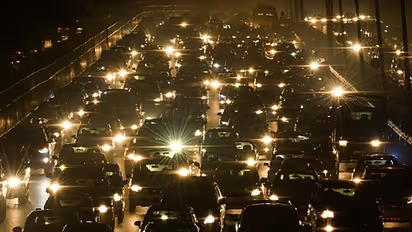Be scared, Bengaluru: Metro work means traffic will get worse before improving

Synopsis
Work on the KR Puram–Central Silk Board line is expected to take at least three years. Land acquisition at vital stretches is yet to be completed. Preparatory roadwork could hit traffic at major IT hubs.
The Karnataka government on January 12 unveiled further plans associated with Namma Metro’s Phase 2, including an elevated road-cum-rail flyover between Central Silk Board and Ragiguda. A major component of Phase 2 — the 17-km metro link between KR Puram and Central Silk Board — is expected to take three years to complete.
While the government has set ambitious targets and massive expectations from the project, underlying issues such as delays in land acquisition and work to relocate utilities could worsen traffic congestion in several locations till the completion of the metro work (assuming it gets completed on time).
Nearly two acres of land are required for the station at Central Silk Board; BMRCL is still continuing negotiations with the Central Government on the land as the Silk Board is a central body. The acquisition of another stretch of land between RV Road and Ragiguda is pending with the National Green Tribunal. BMRCL recently told the Times of India that it would engage three contractors to carry out civil work on the KR Puram–Central Silk Board line. In addition, the Jayadeva Flyover will need to be demolished to build the KR Puram–Central Silk Board line.
The 15.5 km line from Baiyappanahalli to Whitefield will require relocation of old water pipelines near Whitefield. BMRCL officials recently told the Bangalore Mirror the roadwork on this stretch could hit traffic movement for at least six months.
Also read: Metro Phase 2 will let West Bengaluru breathe in peace
The possibility of “knock on” disruption extending to traffic on the Outer Ring Road is very real, given the high vehicular density. During a normal working day, it takes typically more than 60 minutes to travel from the KR Puram Railway station to Central Silk Board. The delays typically worsen in the event of rainfall. Further, the high concentration of IT companies and industrial hubs in Whitefield, Mahadevapura, and Marathahalli up to HSR Layout and Electronics City means that the flow of private vehicles remains high.
Recently, popular cab aggregator Ola released a study on traffic trends in India. The report identified Central Silk Board as being among the seven worst traffic bottlenecks in the country in 2016; the company also noted that Bengaluru had the third-slowest average vehicle speed in the country at 20.4 kmph during peak hours (9 AM to 12 PM).